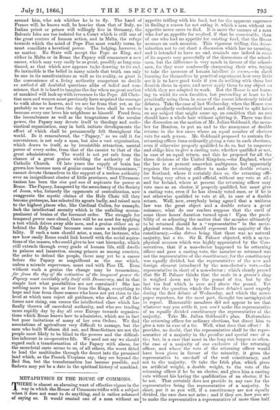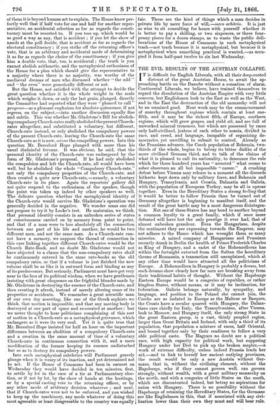METAPHYSICS IN lab HOUSE OF COMMONS.
THERE is almost an alarming want of effective vigour in the way in which the.House of Commons trifles with a subject when it does not want to do anything, and is rather ashamed of saying so. It would remind one of a man without an
appetite trifling with his food, but for the apparent eagerness in finding a reason for not eating it, which a man without an appetite never cares to find. It is more the manner of a man who /du/ an appetite for no-food, if that be conceivable, than of one who had no appetite for existing food, that the House assumes on such occasion. This vigorous trifling, this deter- mination not to cut short a discussion which has no meaning, and is intended to have no end, reminds one indeed in some of its aspects very powerfully of the discussions of the school- men, but the difference is very much in favour of the school- men, for they were confessedly sharpening their wits, trying to take the measure of human intellect in vaello,—in short learning for themselves by practical experiment how very little use it is to have good tools if you do nothing with them but flourish them in space, and never apply them to any object on which they are adapted to work. But the House is not learn- ing to wield its own faculties, but pretending at least to be practically using them in some of the recent laboriously .trivial debates. Take the case of last Wednesday, when the House was in a peculiarly ecclesiastical mood, and disposed to split hairs on any subject that might come up, on condition that no one should have a whole hair without splitting it. There was first the discussion on the motion of Mr. Julian Goldsmid, the mem- ber for Honiton, to put an end to the annoyance of double returns in the few cases where an equal number of electors vote for each person. Mr. Goldsmid proposed to restrain the returning officer from ordinarily giving a vote in such elections, even if otherwise properly qualified to do so, but to empower and oblige him to give a casting vote, whether qualified or not, in case of an equal return, and this he proposed for all the three divisions of the United Kingdom,—for England, where the law is at present somewhat ambiguous, but apparently requires the returning officer to make the double return ; for Scotland, where it certainly does so, the returning offi- cer being very often a paid official, without any vote at all ; and for Ireland, where at present the returning officer may vote once as an elector, if properly qualified, but must give a casting vote, even if he has already voted once, or if he is not otherwise qualified to vote at all, in case of a double return. Well, now, everybody being agreed that a uniform law was the great object and a double return a great nuisance, what do our readers suppose that the cavil of some three hours' duration turned upon ? Upon the possi- bility of so adjusting the matter that the member ultimately to be returned should be a "representative" in the meta- physical sense, that is, should represent the majority of the constituency,—the datum being that there was no natural majority, but a tie. Sir R. Palmer objected, with a meta- physical acumen which was highly appreciated by the Con- servatives, that if a non-elector happened to be returning officer and gave a casting vote, the member so returned was not the representative of the constituency, for the constituency was equally divided, but the representative of the new and foreign element introduced by the non-elector's vote,—the representative in short of a non-elector ; which clearly proved that Sir R. Palmer thinks that the scale in a grocer's shop is weighed down not by the pound of tea, but by the last tea leaf which is over and above the pound. Yet this was the question which the House debated most eagerly during the first debate of Wednesday, and which the news- paper reporters, for the most part, thought too metaphysical to report. Honourable members did not appear to see that whatever way you settle it, you can't make the representative of an equally divided constituency the representative of the majority. Take Mr. Julian Goldsmid's plan. Disfranchise the returning officer for ordinary elections, but direct him to give a vote in case of a tie. Well, what does that effect ? It provides, no doubt, that the representative shall be the repre- sentative of a majority in the peculiar and special case of a tie; but, in a case that must in the long run happen as often, the case of a majority of one exclusive of the returning officer, and where the vote of the returning officer would have been given in favour of the minority, it gives the representative to one-half of the real constituency, and not to the majority. Or take the Irish plan, which gives an artificial weight, a double weight, to the vote of the returning officer if he be an elector, and gives him a casting vote without his having the qualification of an elector, if he be not. That certainly does not provide in any case for the representative being the representative of a majority. In short, put• it as you will, if a constituency are not equally divided, the case does not arise ; and if they are, how you are to make the representative a representative of more than half
of them it is beyond human art to explain. The House know per- fectly well that if half vote for one and half for another repre- sentative, an accidental selection as far as regards the consti- tuency must be resorted to. If you toss up, which would be as good a way as any, that is accident ; if you let the show of hands at the poll decide, that is accident as far as regards the electoral constituency ; if you strike off the returning officer's vote, that is an arbitrary and accidental mode of determining it as far as regards the choice of the constituency ; if you give him a double vote, that, too, is accidental ; the truth is you cannot abolish arithmetic, and the metaphysical enthusiasm of the House for a plan which should give the representative to a majority where there is no majority, was worthy of the mediaeval dreams of men who discussed whether " the odd " and " the even" were generically different or not.
But the House, not satisfied with the attempt to decide the great question whether it is the whole weight in the scale which weighs it down, or only the last grain, plunged, directly the Committee had reported what they were "pleased to call " progress—as a pleasant euphuism for absolute quiescence, if not regress, on the subject,—into another discussion equally fine and subtle. This was whether Mr. Gladstone's Bill for abolish- ing compulsory Church-rates really abolished the present Church- rates altogether, and substituted a voluntary, but different, Church-rate instead, or only abolished the compulsory powers of the present Church-rate, leaving the Church-rate the same Church-rate as it is now, minus the compelling powers. Into this question Mr. Beresford Hope plunged with more than his usual disdainful fervour. It was obvious, he said, that the .personal identity of the Church-rate was endangered by the form of Mr. Gladstone's proposal. If he had only abolished the compulsion and left the Church-rate, all would have been well, but he abolished the whole "Compulsory Church-rate," not only the compulsory properties of the Church-rate, and then created a quite new Church-rate,—namely, a voluntary Church-rate in its place. Again the reporters' gallery did not quite respond to the enthusiasm of the speaker, though the point was taken up indeed by other speakers as well. The delicate question whether the metaphysical identity of the Church-rate would survive Mr. Gladstone's operation was generally decided in the negative. We wonder some one did not propose to try it by Locke's test. He maintains, we think, that personal identity consists in an unbroken series of states of consciousness carried on by memory from point to point, and that if a man were to lose absolutely all the connection between one part of his life and another, he would be two different men, and not the same man. As a Church-rate can- not have a memory, we suppose the thread of connection in this case linking together different Church-rates would be the Church Rate-Book, and no doubt Mr. Gladstone would not have objected to a clause that the non-compulsory rates shall be continuously entered in the same rate-books as the old compulsory rates, or that if a volume is just finished the new volume shall be as like it in outward form and binding as any of its predecessors. But seriously, Parliament must have got very near to the lees of its political wisdom, when we have gentlemen insisting with great eloquence on the frightful blunder made by Mr. Gladstone in destroying the essence of the Church-rate, and then creating it afresh, instead of merely altering some of its properties or accidents. We remember a great scientific man of our own day asserting, like one of the Greek sophists we think, that motion is impossible, and that any moving body is destroyed at one part of space and re-created at another ; but we never thought to hear politicians complaining of this sort of motion in a Church-rate as a metaphysical grievance, which endangers as it were its very soul. Yet it is quite true that Mr. Beresford. Hope insisted for half an hour on the important difference between an abolition of a compulsory Church-rate and a creation in the same amount of time of a voluntary Church-rate in continuous connection with it, and a mere modification of the former keeping its essence undisturbed but so as to destroy its compulsory powers. Into such metaphysical subtleties will Parliament gravely plunge when it is weary of its inaction, and yet determined not to act. If the House of Commons had been in earnest on Wednesday they would have decided in ten minutes, first, to settle by lot in the case of a tie at Parliamentary elec- tion, or if not by lot, by the show of hands at the hustings, or by a special casting vote to the returning officer, or by any other mode of arbitrary decision whatever ; and next, that if Church-rates were not to be enforced, and you wished to keep up the machinery, any mode whatever of doing this most agreeable or least disagreeable to the country was equally fair. These are the kind of things which a man decides in private life by mere force of will,—mero arbitrio. It is just as wise to sit consulting for hours with yourself whether it is better to pay a shilling, or two sixpences, or three four- penny pieces for a dozen stamps, as to waste the public deli- berations of the House of Commons in such metaphysical trash—not trash because it is metaphysical, but because it is metaphysical when something practical is wanted,—as occu- pied it from half-past twelve to six last Wednesday.































 Previous page
Previous page